Curriculum
The Med-Peds training progam is designed to provide a comprehensive four-year training program that will enable graduates to be board certified in Internal Medicine and Pediatrics. Through early exposure to medicine and pediatric subspecialties, residents have the opportunity to explore a wide variety of career opportunities.
The program follows the Med-Peds guidelines agreed upon by both the American Board of Internal Medicine and the American Board of Pediatrics. The goal of the curriculum is to offer comprehensive training for any of several possible career paths, including primary care Med-Peds, subspecialty training, academic medicine and even research.
Our schedule for residents is divided into three-month blocks, alternating pediatrics and medicine for their first two years of training. For the last two years, residents change rotations in four-month blocks. This allows for some seasonal variation as residents become more comfortable switching back and forth between the disciplines. The curriculum is flexible to help accommodate the needs of each individual resident.
Schedule
This sample schedule lays out Pediatric and Internal Medicine rotations at Children's Nebraska, Nebraska Medicine and the Omaha VA Medical Center.
Internal Medicine
- 2 months UNMC wards
- 1 month VA wards
- 1 month UNMC cardiology
- 1 month ER
- 1 month Fontenelle Health Center
Pediatrics
- 3 months Children's Nebraska wards
- 1 month NICU
- 1 month UNMC newborn/ambulatory
- 1 month elective
Internal Medicine
- 1 month UNMC TBR ("intern")
- 1 month wards supervisor
- 1 month ICU
- 1 month geriatrics
- 2 months elective
Pediatrics
- 1 month Children's Nebraska wards
- 1 month PICU
- 1 month behavior and development
- 1 month Children's Nebraska emergency department
- 2 months elective
Choose from pediatrics or internal medicine focus.
Pediatrics-focused:
- Pediatrics
- 1 month Children's Nebraska supervisor (with night shifts)
- 1 month adolescent
- 1 month Fontenelle Health Center
- 1 month pediatric emergency department
- 1 month pediatric mental health
- 3 months elective
- Internal Medicine
- 2 months supervisor (VA wards/UNMC TBR or VA nights/UNMC supervisor)
- 2 months elective
Internal Medicine-focused:
- Pediatrics
- 1 month Children's Nebraska supervisor (with night shifts)
- 3 months elective
- Internal Medicine
- 2 months supervisor (VA wards/UNMC TBR or VA nights/UNMC supervisor)
- 6 months elective
Choose from pediatrics or internal medicine focus.
Internal medicine-focused:
- Internal Medicine
- 1 month supervisor
- 5 months elective
- 1 month board review
- 1 month VA or UNMC ICU
- Pediatrics
- 1 month Children's Nebraska wards
- 2 months elective
- 1 month newborn nursery/UNMC clinic
Pediatrics-focused:
- Pediatrics
- 1 month Children's Nebraska wards
- 1 month Children's Nebraska emergency department
- 1 month adolescent
- 1 month newborn nursery/UNMC clinic
- 1 month Fontenelle Health Center
- 1 month board review
- 1 month elective
- 1 month pediatric mental health
- Internal Medicine
- 1 month supervisor
- 2 months elective
- 1 month VA or UNMC ICU
Pediatric Rotation Schedules
This gives an outline of a typical schedule on our pediatrics rotations.
-
Pediatrics inpatient wards include days shifts with a night float system from Sunday through Thursday with cross cover coverage on the weekends and occasionally a 24 hour cross cover shift.
-
Residents complete approximately 2 weeks of days, one week of swing shift and one week of nights for every inpatient month.
-
Residents arrive at 6 am to receive hand off from the night team. Hand off is given to the night team at 5 pm.
-
Night shift residents receive hand off from the day team at 5 pm. Night shift residents cross cover on admitted patients and complete new admissions. Patients are handed back off to day team at 6 am.
-
Swing shift residents are present Monday to Friday from 4 pm to 12 am to help with the higher volume of admissions that arrive during this time.
-
Over the course of the month interns average one day off in every seven days, for a total of four days in the month.
-
Interns on elective months fill in on cross cover day and night shifts on the weekends.
-
Pediatric inpatient wards consist of day shifts Sunday through Thursday, with 24-hour cross cover shifts on Fridays and Saturdays.
-
Senior residents cover two weeks of night float coverage during one of their inpatient months during their third year.
-
Senior residents arrive at 6:30 am and receive hand off from night resident. Hand off to the night team is at 5 pm.
-
One senior resident on Friday and one on Saturday of every weekend complete one 24-hour shift, as part of the weekend coverage.
-
The NICU is an inpatient month in which each resident completes six to seven 24-hour shifts over the course of the month.
-
Residents arrive between 6 to 6:30 am daily.
-
Residents who are not on call typically leave between 3 and 5 pm.
-
The call resident is on call from 6 am until 6 am the following morning and leave before rounds.
-
The PICU is an inpatient month in which residents complete three weeks of day shifts with one week of night float coverage.
-
Residents work two weeks (six days equals one week) in the pediatric medical ICU, which includes two weeks of day shifts with shifts from 6:30 am-6:30 pm.
-
Residents do one week of nights 6:30 pm to 6:30 am (five nights equals one week).
-
CICU is no longer a required part of PICU but may be of interest for some residents.
-
Residents will average one day off in seven, or four days off throughout the month,
-
Residents complete 14 to 16 shifts during their emergency department month.
-
Shifts include day shift from 9 am to 7 pm, swing shift from 1 pm to 11 pm and night shift from 6 pm to 4 am.
-
Residents work a combination of all three shifts during their month.
-
The Newborn/Ambulatory rotation is composed of inpatient mornings in the newborn nursery and afternoons in clinic.
-
Residents round in the newborn nursery Monday through Friday from 6:30 am to 12 pm.
-
In the afternoon, they attend continuity clinic or ambulatory clinic at UNMC from 1 to 5 pm.
-
Residents are required to round in the newborn nursery one weekend per month.
-
Pediatric electives are a combination of inpatient and outpatient experiences. Typically, they are limited to responsibilities Monday through Friday from 7 am to 5 pm.
-
Residents typically help out with one to two cross cover shifts throughout the course of the month for inpatient wards and PICU on the weekends.
-
Residents are typically scheduled for backup coverage or cross coverage for the inpatient wards one to two weekends per month.
Internal Medicine Rotation Schedules
This gives an outline of a typical schedule on the internal medicine core and elective rotations.
-
There are two wards layouts: “Meyer” (traditional wards teams) and "TBR" (tower-based rounds/hospitalist rotation).
-
Meyer is a traditional model with a supervising resident, two interns, medical students and one attending.
-
TBR is a modified hospitalist rotation. Upper-level residents do oncology/hospitalist rounding, nights and POCUS. Intern (and med/peds HO2) do nights, Innovation Design Unit rounding and multidisciplinary days.
-
Inpatient internal medicine wards (“Meyer”) include day shift with a novel night float system Monday through Thursday and Friday through Sunday.
-
Monday through Thursday nights will be covered by “TBR” (hospitalist) upper level resident plus the “TBR” intern
-
Friday through Sunday will be covered by “TBR” supervising resident and the traditional wards long-call intern.
-
Residents arrive between 6 to 7 am. Hand off to the night team is between 5 and 7 pm.
-
No admissions on pre or post call days.
-
Residents rotate through a short call 1 (admit from 6 am to noon), short call 2 (admit from 1 to 5:30 pm), pre call, long call (admit from 7 am to 6:30 pm) and post call schedule during the week.
-
The day intern arrives back at the hospital early with enough time to complete their duties for rounds and patient care, with entire team signing out their patients by noon.
Intern Ward Schedule VA
-
The internal medicine inpatient wards include a 24-hour admitting shift every five days.
-
Interns split the 24-hour admitting shifts.
-
The day intern arrives between 6 and 7 am.
-
The night cover intern arrives at 5 pm to relieve the day intern. The night intern will work overnight with a senior resident on their VA outpatient/night float rotation. The night intern completes their duties and leaves the hospital by noon.
-
Senior Ward Schedule VA
-
The internal medicine inpatient wards include a 24-hour admitting shift every 5 days.
-
The senior resident arrives between 6 and 7 am. Hand off to the night team when not on call is at 5 pm.
On an admitting day, the senior resident from their VA outpatient/night float rotation will arrive at 7 pm to relieve the day senior resident.
-
The emergency department rotation is split with two weeks being completed at the emergency department at UNMC and two weeks at the VA emergency department.
-
Shifts at the VA are Monday through Friday (no weekends or holidays) and are from 8 am to 5 pm or from 1 to 9 pm. Some shifts may be only four hours around continuity clinic.
-
Shifts at UNMC are a combination of swing shifts from 10 am to 9 pm, day swing shift from 10 am to 7 pm and night shift from 6:30 pm to 3:30 am. There are approximately eight shifts in two weeks and scheduled around continuity clinic.
- The cardiology rotation is an inpatient rotation in which residents complete three weeks of days with one night of night float coverage.
- Hand off in the morning is at approximately 6:30 am and hand off to the night team is at approximately 7 pm.
- Each resident completes one week of overnights, covering the cardiology service patients.
- Each resident averages one day off in seven throughout the month for a total of 4 days off.
- This month is a clinic based rotation completed at our Fontenelle Clinic where we have our Med- Peds continuity clinic.
- Clinic is typically from 8:30 am to 5 pm.
- In the morning, residents see patients off of the attendings schedule.
- Each afternoon, residents have their own patient panel or they attend their regular internal medicine or pediatrics continuity clinic.
- Fridays are reserved for residents to work on advocacy project and other academic projects.
- This is an inpatient rotation in our ICU that includes three weeks of day shifts with five to six nights of night float coverage.
- Hand off in the morning occurs between 6:30 to 6:45 am.
- The day team residents rotate positions as the day resident, short call and long call resident.
- The day resident typically leaves around 3 to 4 pm, with the short call resident leaving at 5 pm and the long call resident staying to give hand off to the night cover provider at 7 pm.
- The goal is to rotate who stays late each day, although, this is dependent on the events of the day.
- Each resident completes five nights of cross cover from 7 pm to 7 am.
- Other elective rotations are a combination of inpatient and outpatient experiences.
- The hour requirement for these rotations vary. Typically, core electives such as GI, nephrology, endocrinology, pulmonology and infectious disease require residents to work for two weekends during the month and have two weekends off depending on how many residents are on the rotation.
- Senior residents participate in home call on select rotations with a fellow or attending always available to answer calls and questions

The UNMC Med-Peds Residency Program's faculty and training sites encourage collaboration and support.
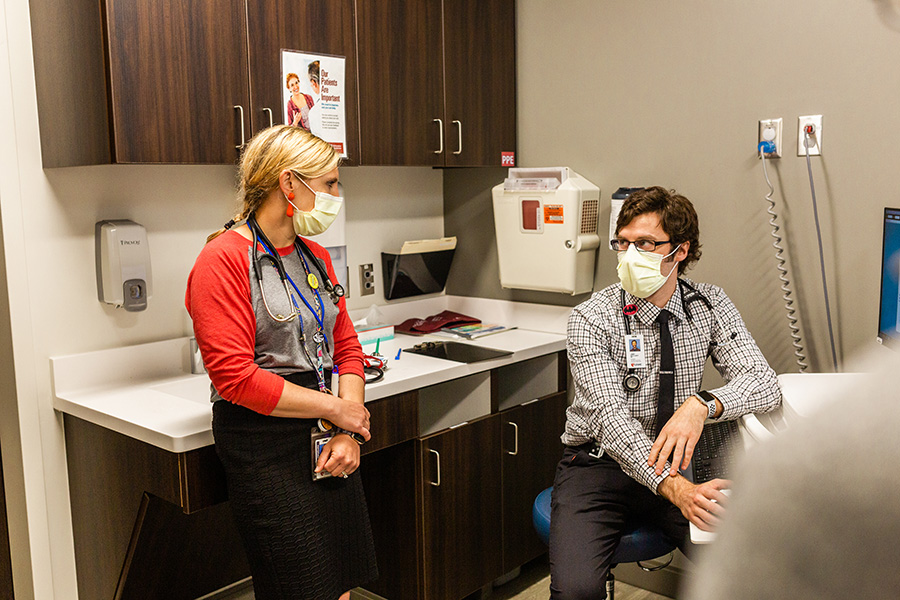
Fontenelle Health Center is the primary Med-Peds clinic and the patient population provides varied learning opportunities for residents.
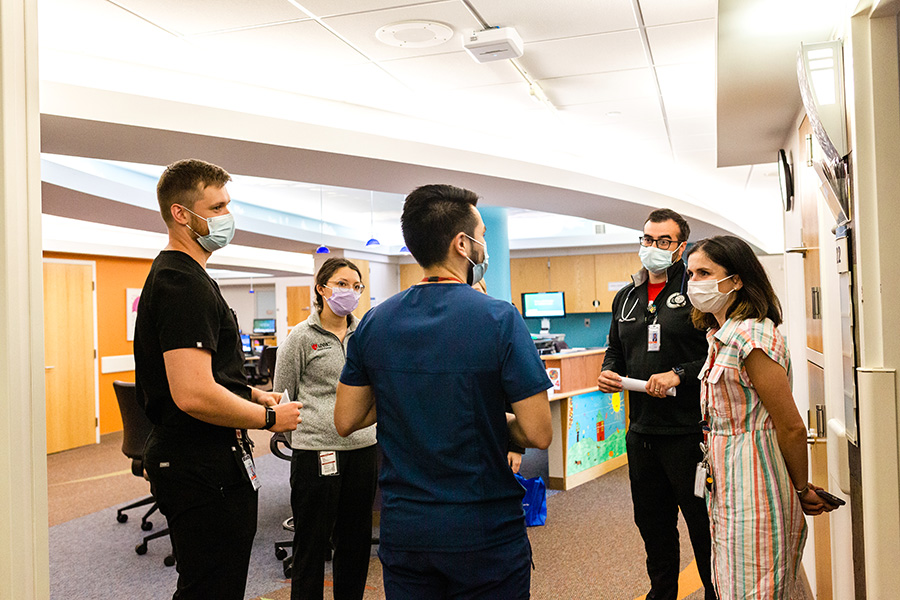
The facilities of UNMC's clinical partners – Nebraska Medicine, Children’s Nebraska, and the Omaha VA Medical Center – support multiple specialties and subspecialties.
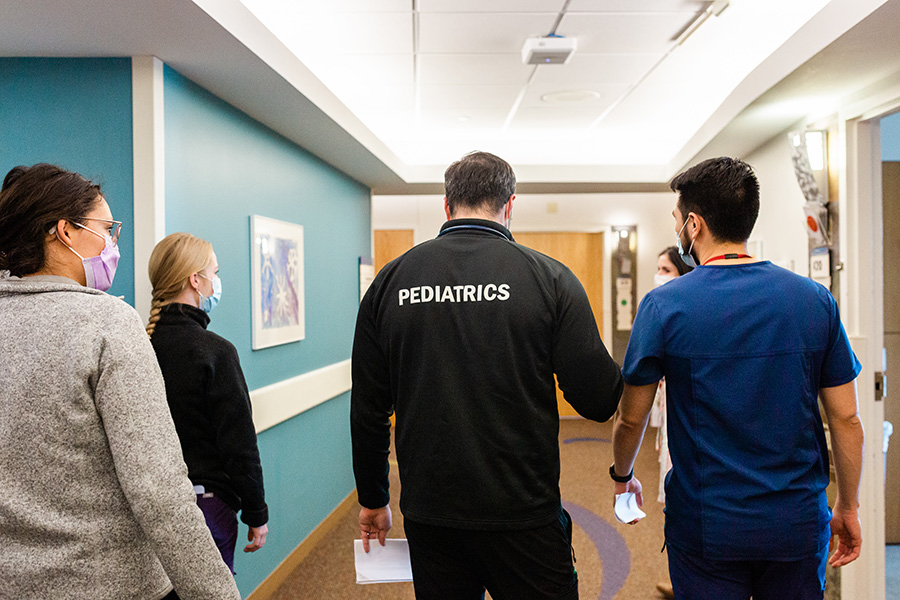
Residents rounding at Children's Nebraska, one of the Med-Peds program's training sites.
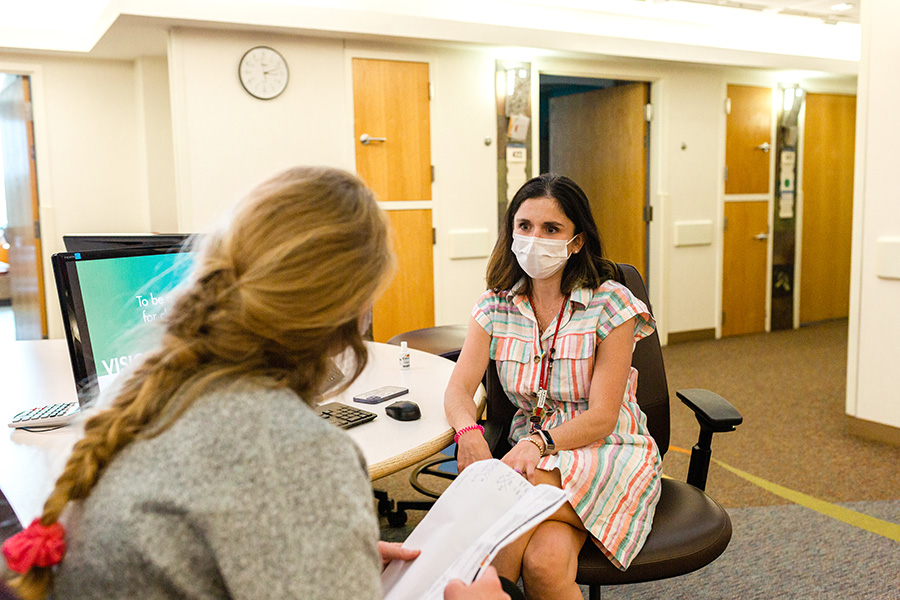
UNMC's supportive environment is an ideal setting in which to undertake the demanding yet rewarding Med-Peds training.

POCUS Training
This curriculum teaches skills in cardiac, pulmonary, abdominal, soft tissue, and procedure ultrasound imaging.
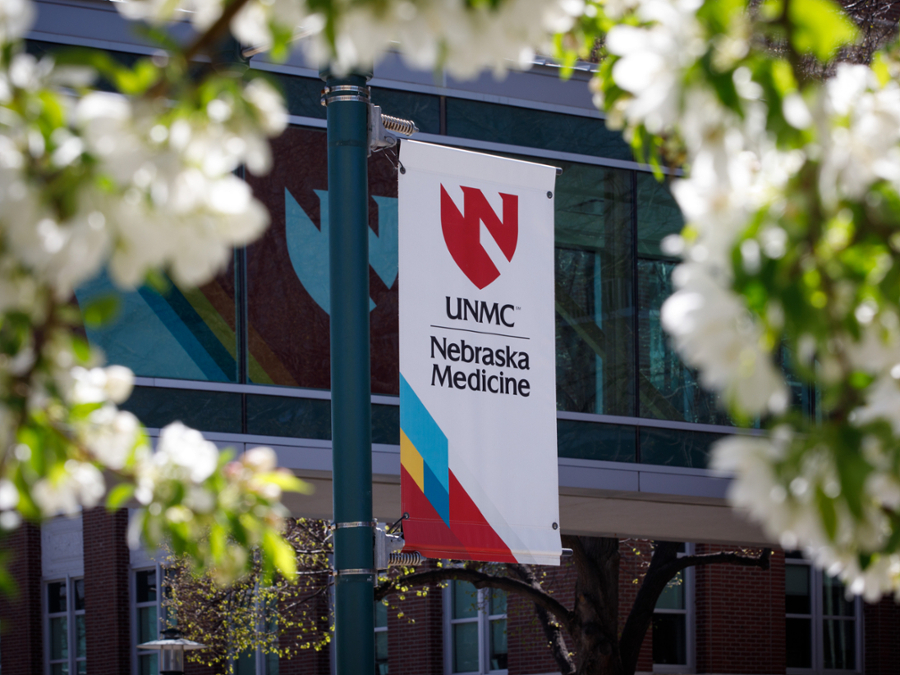
Health Educators & Academic Leaders
This curriculum focuses on teaching practices, educational scholarship, and academic leadership.